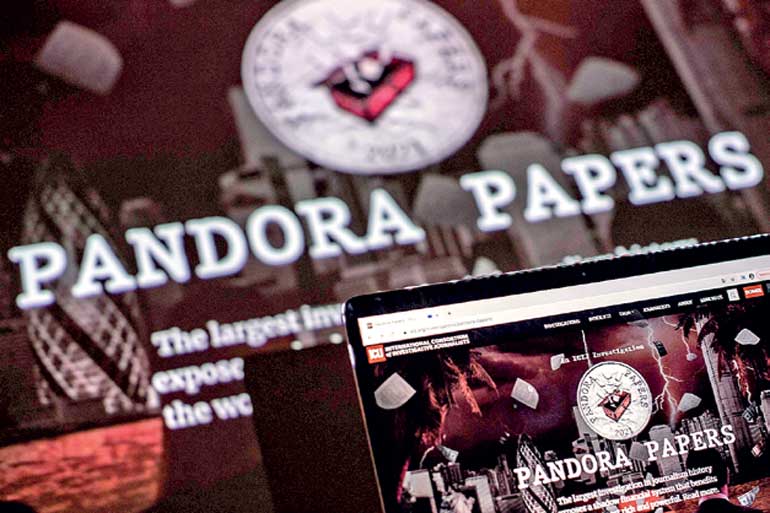Wednesday Feb 18, 2026
Wednesday Feb 18, 2026
Tuesday, 5 October 2021 02:18 - - {{hitsCtrl.values.hits}}

This photograph illustration shows the logo of Pandora Papers, in Lavau-sur-Loire, western France, on 4 October – AFP
NEW YORK (AFP): Governments moved Monday to limit the fallout from a release of millions of documents detailing how leaders have used offshore tax havens to stash assets worth hundreds of millions of dollars.
Some 35 current and former leaders are featured in roughly 11.9 million documents leaked from financial services companies across the world that include reports of luxury homes on the French Riviera, Monte Carlo and California.
The documents, known as the ‘Pandora Papers’ were obtained by the International Consortium of Investigative Journalists (ICIJ) and released in stories by media partners including The Washington Post, the BBC and The Guardian.
Allegations range from corruption to money laundering and tax avoidance.
Although holding assets offshore or using shell companies is not illegal in most countries, the revelations are embarrassing for leaders who have pushed austerity measures or campaigned against corruption.
Russian leader Vladimir Putin is not named but he is linked via associates to secret assets in Monaco, particularly a waterfront home acquired by a Russian woman reported to have had a child with him.
“This is just a set of largely unsubstantiated claims,” Kremlin Spokesman Dmitry Peskov said. “We didn't see anything on hidden wealth within Putin's inner circle.”
Jordan was also keen to play down the revelations, which exposed how King Abdullah II created a network of offshore companies and tax havens to amass a $ 100 million property empire from California to London.
The country's royal court said the properties were funded with the king's personal wealth and were used for official and private visits.
“Any allegations that link these private properties to public funds or assistance are baseless and deliberate attempts to distort facts,” a statement said.
The ICIJ found links between almost 1,000 companies in offshore havens and 336 high-level politicians and public officials, including more than a dozen serving heads of state and government, country leaders, cabinet ministers, ambassadors and others.
More than two-thirds of the companies were set up in the British Virgin Islands.
Family and associates of Azerbaijani President Ilham Aliyev — long accused of corruption in the central Asian nation — are alleged to have been secretly involved in property deals in Britain worth hundreds of millions.
And the documents also show how Czech Prime Minister Andrej Babis — who faces an election later this week — failed to declare an offshore investment company used to purchase a chateau worth $ 22 million in the south of France.
“I have never done anything illegal or wrong,” Babis hit back in a tweet, calling the revelations a smear attempt aimed at influencing the election.
Nearly two million of the 11.9 million leaked documents came from a Panamanian law firm called Alcogal, which the ICIJ said had become “a magnet for the rich and powerful” seeking to hide wealth offshore.
Alcogal, whose clients allegedly included the Jordanian monarch and Czech Prime Minister, rejected accusations of shady dealings.
ICIJ Director Gerard Ryle said in a video accompanying the investigation that those best placed to halt such practices were the ones who were benefiting most.
Transparency International's Maira Martini called for an end to the offshore industry, saying the investigation once more offered “clear evidence” of how it “promotes corruption and financial crime”.
Among the other revelations from the ICIJ investigation:
The Pandora Papers are the latest in a series of mass leaks handled by the ICIJ, from LuxLeaks in 2014, to the 2016 Panama Papers. They were followed by the Paradise Papers in 2017 and FinCen files in 2020.
